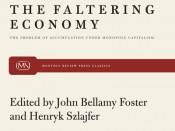“Marx and the Dialectic of Orgainc/Inorganic Relations: A Rejoinder to Salleh and Clark” [PDF] (coauthored with Paul Burkett, Foster listed first), Organization and Environment, vol. 14, no. 4 (December 2001), pp. 451-62. DOI: 10.1177/1086026601144006
Our article “The Dialectic of Organic/Inorganic Relations: Marx and the Hegelian Philosophy of Nature” (Foster & Burkett, 2000) appeared in Oraganization & Environment exactly a 1 year ago. Our purpose in that article was a very specific one made very clear from the beginning. We were concerned with addressing one of the most persistent and seemingly peretrating criticisms of Marx for his supposed insensitivity to ecological issues, namely, the claim that in referring to nature as “the inorganic body of a man” in his Economic and Philosophic Manuscripts of 1884, a work otherwise known for its ecological values, thus, sinning irredeemable against ecology and no less so against dialectics (Marx, 1974, p. 328).
